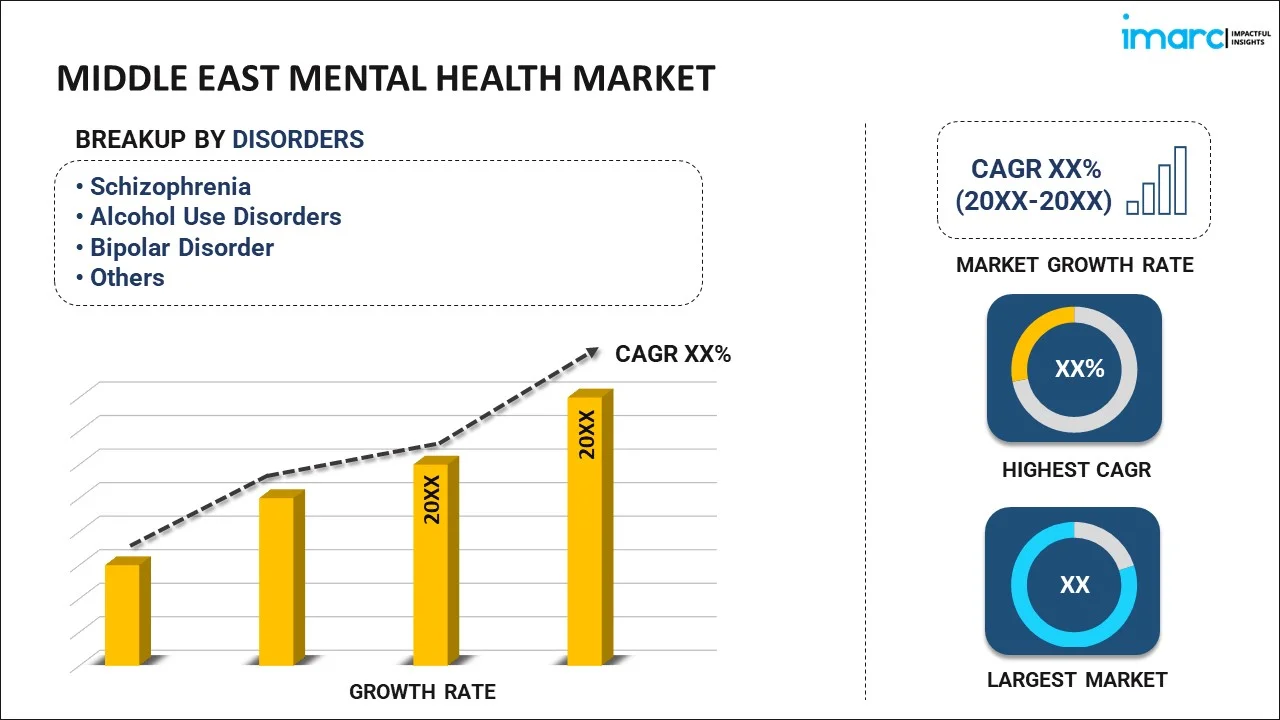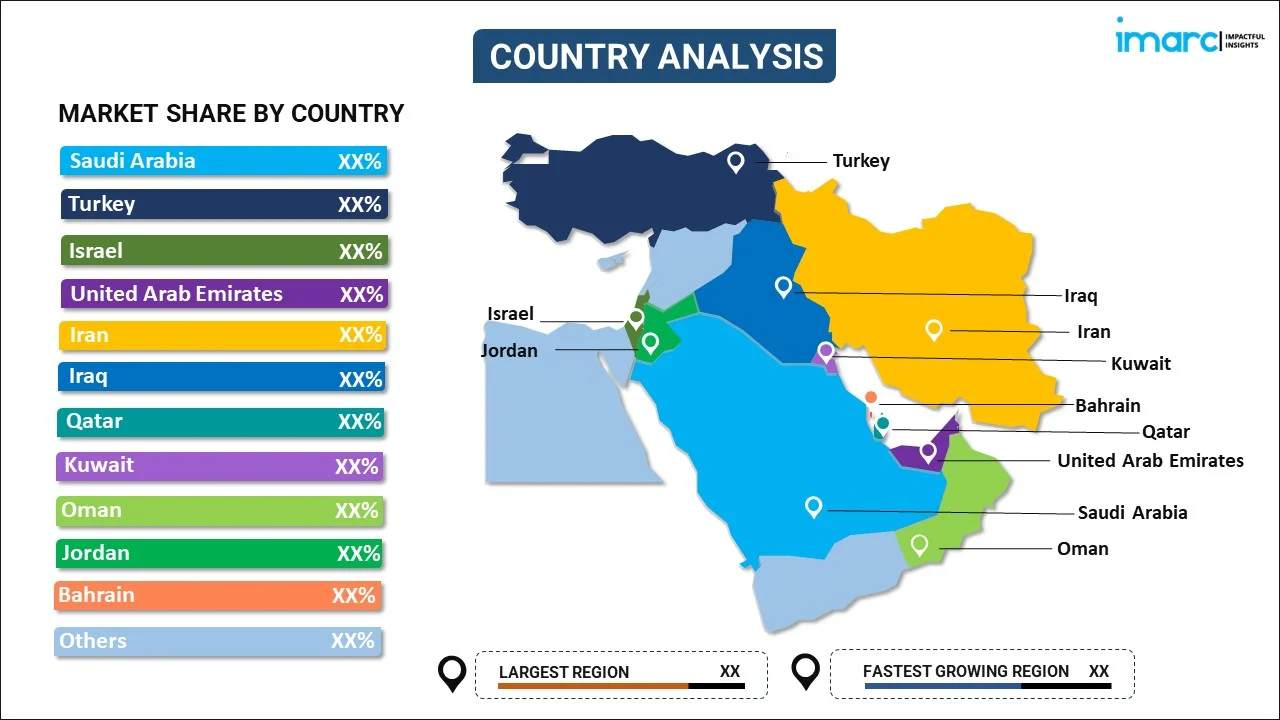
Middle East Mental Health Market Report by Disorder (Schizophrenia, Alcohol Use Disorders, Bipolar Disorder, Depression and Anxiety, Post-traumatic Stress Disorder, Substance Abuse Disorders, Eating Disorders, and Others), Service (Emergency Mental Health Services, Outpatient Counselling, Home-based Treatment Services, Inpatient Hospital Treatment Services, and Others), Age Group (Pediatric, Adult, Geriatric), and Country 2026-2034
Market Overview:
Middle East mental health market size reached USD 20,522.6 Million in 2025. Looking forward, IMARC Group expects the market to reach USD 27,538.3 Million by 2034, exhibiting a growth rate (CAGR) of 3.32% during 2026-2034. The rising awareness among the masses about the importance of maintaining mental health, shifting societal perceptive towards mental health issues, and the growing emphasis on research and data-driven approaches to improve mental health practices represent some of the key factors driving the market.
|
Report Attribute
|
Key Statistics
|
|---|---|
|
Base Year
|
2025 |
|
Forecast Years
|
2026-2034
|
|
Historical Years
|
2020-2025
|
| Market Size in 2025 | USD 20,522.6 Million |
| Market Forecast in 2034 | USD 27,538.3 Million |
| Market Growth Rate (2026-2034) | 3.32% |
Access the full market insights report Request Sample
Mental health refers to the emotional, psychological, and social well-being of individuals. It contributes to a higher quality of life, enabling individuals to experience happiness, fulfillment, and a sense of purpose. It helps people cope with a wide range of emotions, including happiness, sadness, anger, and fear. It also includes the skill of recognizing, understanding, and managing feelings in a healthy and balanced manner, avoiding extremes like excessive anger or depression. It fosters the ability to form and maintain meaningful and supportive social connections, promoting a sense of belonging and emotional support. It can lead to better physical health outcomes, such as improved immune function and lower risk of chronic illnesses. It promotes healthier and more fulfilling relationships with family, friends, and colleagues, leading to greater overall satisfaction in life.
Middle East Mental Health Market Trends:
The rising awareness among the masses about the importance of maintaining mental health to lead a stress-free and fulfilling life is encouraging them to seek mental health services. Additionally, shifting societal attitude towards mental health issues the are strengthening the growth of the market in Middle East. Along with this, rapid urbanization, increasing work-related stress, and lifestyle changes are resulting in rising stress levels among the population, which, in turn, is driving the demand for mental health services. Furthermore, the widespread adoption of technology, including telehealth solutions, is expanding access to mental health services in the region. Telehealth platforms offer remote consultations with mental health professionals, making it easier for individuals in rural or remote areas to receive care. Moreover, governing authorities and non-profit organizations (NPOs) are focusing on rising awareness about mental health issues, which is stimulating the market growth. Governing agencies in Middle East are taking proactive measures to improve mental health services. They are investing in mental health infrastructure, increasing the number of mental health professionals, and integrating mental health into primary healthcare systems. These government initiatives are expanding access to mental health services. Apart from this, various employers in the Middle East are increasingly investing in workplace mental health programs to support the well-being of their employees. These initiatives include stress management workshops, Employee Assistance Programs (EAPs), and mental health awareness campaigns. Along with this, the growing emphasis on research and data-driven approaches to improve mental health practices in the Middle East is positively influencing the market. Researchers are studying the unique mental health challenges of the region and tailoring interventions based on data-driven insights.
Middle East Mental Health Market Segmentation:
IMARC Group provides an analysis of the key trends in each segment of the market, along with forecasts at the regional and country levels for 2026-2034. Our report has categorized the market based on disorder, service, and age group.
Disorder Insights:

To get detailed segment analysis of this market Request Sample
- Schizophrenia
- Alcohol Use Disorders
- Bipolar Disorder
- Depression and Anxiety
- Post-traumatic Stress Disorder
- Substance Abuse Disorders
- Eating Disorders
- Others
The report has provided a detailed breakup and analysis of the market based on the disorder. This includes schizophrenia, alcohol use disorders, bipolar disorder, depression and anxiety, post-traumatic stress disorder, substance abuse disorders, eating disorders, and others.
Service Insights:
- Emergency Mental Health Services
- Outpatient Counselling
- Home-based Treatment Services
- Inpatient Hospital Treatment Services
- Others
A detailed breakup and analysis of the market based on the service have also been provided in the report. This includes emergency mental health services, outpatient counselling, home-based treatment services, inpatient hospital treatment services, and others.
Age Group Insights:
- Pediatric
- Adult
- Geriatric
The report has provided a detailed breakup and analysis of the market based on the age group. This includes pediatric, adult, and geriatric.
Country Insights:

To get detailed regional analysis of this market Request Sample
- Saudi Arabia
- Turkey
- Israel
- United Arab Emirates
- Iran
- Iraq
- Qatar
- Kuwait
- Oman
- Jordan
- Bahrain
- Others
The report has also provided a comprehensive analysis of all the major regional markets, which include Saudi Arabia, Turkey, Israel, United Arab Emirates, Iran, Iraq, Qatar, Kuwait, Oman, Jordan, Bahrain, and Others.
Competitive Landscape:
The market research report has also provided a comprehensive analysis of the competitive landscape in the market. Competitive analysis such as market structure, key player positioning, top winning strategies, competitive dashboard, and company evaluation quadrant has been covered in the report. Also, detailed profiles of all major companies have been provided.
Middle East Mental Health Market Report Coverage:
| Report Features | Details |
|---|---|
| Base Year of the Analysis | 2025 |
| Historical Period | 2020-2025 |
| Forecast Period | 2026-2034 |
| Units | Million USD |
| Scope of the Report | Exploration of Historical and Forecast Trends, Industry Catalysts and Challenges, Segment-Wise Historical and Predictive Market Assessment:
|
| Disorders Covered | Schizophrenia, Alcohol Use Disorders, Bipolar Disorder, Depression and Anxiety, Post-traumatic Stress Disorder, Substance Abuse Disorders, Eating Disorders, Others |
| Services Covered | Emergency Mental Health Services, Outpatient Counselling, Home-based Treatment Services, Inpatient Hospital Treatment Services, Others |
| Age Groups Covered | Pediatric, Adult, Geriatric |
| Countries Covered | Saudi Arabia, Turkey, Israel, United Arab Emirates, Iran, Iraq, Qatar, Kuwait, Oman, Jordan, Bahrain, Others |
| Customization Scope | 10% Free Customization |
| Post-Sale Analyst Support | 10-12 Weeks |
| Delivery Format | PDF and Excel through Email (We can also provide the editable version of the report in PPT/Word format on special request) |
Key Questions Answered in This Report:
- How has the Middle East mental health market performed so far and how will it perform in the coming years?
- What has been the impact of COVID-19 on the Middle East mental health market?
- What is the breakup of the Middle East mental health market on the basis of disorder?
- What is the breakup of the Middle East mental health market on the basis of service?
- What is the breakup of the Middle East mental health market on the basis of age group?
- What are the various stages in the value chain of the Middle East mental health market?
- What are the key driving factors and challenges in the Middle East mental health?
- What is the structure of the Middle East mental health market and who are the key players?
- What is the degree of competition in the Middle East mental health market?
Key Benefits for Stakeholders:
- IMARC’s industry report offers a comprehensive quantitative analysis of various market segments, historical and current market trends, market forecasts, and dynamics of the Middle East mental health market from 2020-2034.
- The research report provides the latest information on the market drivers, challenges, and opportunities in the Middle East mental health market.
- Porter's five forces analysis assist stakeholders in assessing the impact of new entrants, competitive rivalry, supplier power, buyer power, and the threat of substitution. It helps stakeholders to analyze the level of competition within the Middle East mental health industry and its attractiveness.
- Competitive landscape allows stakeholders to understand their competitive environment and provides an insight into the current positions of key players in the market.
Need more help?
- Speak to our experienced analysts for insights on the current market scenarios.
- Include additional segments and countries to customize the report as per your requirement.
- Gain an unparalleled competitive advantage in your domain by understanding how to utilize the report and positively impacting your operations and revenue.
- For further assistance, please connect with our analysts.
 Request Customization
Request Customization
 Speak to an Analyst
Speak to an Analyst
 Request Brochure
Request Brochure
 Inquire Before Buying
Inquire Before Buying




.webp)




.webp)












